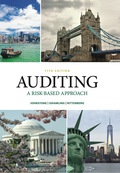
EBK AUDITING: A RISK BASED-APPROACH
11th Edition
ISBN: 9781337670203
Author: RITTENBERG
Publisher: YUZU
expand_more
expand_more
format_list_bulleted
Question
Chapter 4, Problem 2CYBK
To determine
Introduction: The independent examination of the financial statements of an entity is termed as an audit. In an audit engagement, the auditor provides an opinion on the true and fair view of the financial statements.
To identify: Whether the given statement is true or false.
Expert Solution & Answer
Want to see the full answer?
Check out a sample textbook solution
Students have asked these similar questions
What is the budgeted total cost of direct materials purchases?
Hy expert provide answer with calculation
During September, the assembly department completed 10,500 units of a product that had a standard materials cost of 3.0 square feet per unit at $2.40 per square foot. The actual materials purchased consisted of 22,000 square feet at $2.60 per square foot, for a total cost of $57,200. The actual material used during this period was 25,500 square feet. Compute the materials price variance and materials usage variance.
Chapter 4 Solutions
EBK AUDITING: A RISK BASED-APPROACH
Ch. 4 - Prob. 1CYBKCh. 4 - Prob. 2CYBKCh. 4 - Prob. 3CYBKCh. 4 - Prob. 4CYBKCh. 4 - Prob. 5CYBKCh. 4 - Prob. 6CYBKCh. 4 - Prob. 7CYBKCh. 4 - Prob. 8CYBKCh. 4 - Prob. 9CYBKCh. 4 - Prob. 10CYBK
Ch. 4 - Prob. 11CYBKCh. 4 - Prob. 12CYBKCh. 4 - Prob. 1RQSCCh. 4 - Prob. 2RQSCCh. 4 - Prob. 3RQSCCh. 4 - Prob. 4RQSCCh. 4 - Prob. 5RQSCCh. 4 - Prob. 6RQSCCh. 4 - Refer to the Focus on Fraud feature “Moss Adams...Ch. 4 - Prob. 8RQSCCh. 4 - Prob. 9RQSCCh. 4 - Prob. 10RQSCCh. 4 - Prob. 11RQSCCh. 4 - Prob. 12RQSCCh. 4 - Prob. 13RQSCCh. 4 - Prob. 14RQSCCh. 4 - Prob. 15RQSCCh. 4 - Prob. 16RQSCCh. 4 - Prob. 17RQSCCh. 4 - Prob. 18RQSCCh. 4 - Prob. 19RQSCCh. 4 - Prob. 20RQSCCh. 4 - Prob. 21RQSCCh. 4 - Able Corporation decided to make a public offering...Ch. 4 - KPMG (LO 1, 2, 3) KPMG LLP served as the external...Ch. 4 - ToshIba, EY (LO 1, 2, 3) In 2015, the business...
Knowledge Booster
Similar questions
- Bluesy Electronics recorded the following financial data: Net Sales $720,500 Average Inventory at Cost = $80,200 Gross Margin Percentage = 42% Calculate the GMROI.arrow_forwardNeed help this question solutionarrow_forwardXYZ Company has a gross profit margin of 0.30, an operating profit margin of 18%, a total asset turnover ratio of 2.0x, and cost of goods sold of $700,000. The company's tax rate is 35%, and it has no debt. Calculate XYZ Company's Return on Assets (ROA).arrow_forward
- MON Pools builds custom swimming pools. MON budgets that they will build 16 pools during the month of June at a price of $22,750 per pool. The actual pools built by MON during June were 13 pools at a price of $23,420 per pool. What is the Flexible Budget Variance for June?arrow_forwardAnderson Corp. pays its employees every Friday for work performed through that Friday. Anderson employees work Monday through Friday and do not work on weekends. The gross payroll for Anderson is $12,500 each week. Anderson will pay its employees $12,500 on Friday, May 8th. This payroll is for wages earned Monday, May 4th through Friday, May 8th. How much of the $12,500 paid on May 8th should be expensed in May?arrow_forwardPlease solve this problem general accounting question don't use ai solutionarrow_forward
arrow_back_ios
SEE MORE QUESTIONS
arrow_forward_ios
Recommended textbooks for you
 Auditing: A Risk Based-Approach (MindTap Course L...AccountingISBN:9781337619455Author:Karla M Johnstone, Audrey A. Gramling, Larry E. RittenbergPublisher:Cengage Learning
Auditing: A Risk Based-Approach (MindTap Course L...AccountingISBN:9781337619455Author:Karla M Johnstone, Audrey A. Gramling, Larry E. RittenbergPublisher:Cengage Learning Auditing: A Risk Based-Approach to Conducting a Q...AccountingISBN:9781305080577Author:Karla M Johnstone, Audrey A. Gramling, Larry E. RittenbergPublisher:South-Western College Pub
Auditing: A Risk Based-Approach to Conducting a Q...AccountingISBN:9781305080577Author:Karla M Johnstone, Audrey A. Gramling, Larry E. RittenbergPublisher:South-Western College Pub Financial Reporting, Financial Statement Analysis...FinanceISBN:9781285190907Author:James M. Wahlen, Stephen P. Baginski, Mark BradshawPublisher:Cengage Learning
Financial Reporting, Financial Statement Analysis...FinanceISBN:9781285190907Author:James M. Wahlen, Stephen P. Baginski, Mark BradshawPublisher:Cengage Learning- Business/Professional Ethics Directors/Executives...AccountingISBN:9781337485913Author:BROOKSPublisher:Cengage

Auditing: A Risk Based-Approach (MindTap Course L...
Accounting
ISBN:9781337619455
Author:Karla M Johnstone, Audrey A. Gramling, Larry E. Rittenberg
Publisher:Cengage Learning

Auditing: A Risk Based-Approach to Conducting a Q...
Accounting
ISBN:9781305080577
Author:Karla M Johnstone, Audrey A. Gramling, Larry E. Rittenberg
Publisher:South-Western College Pub

Financial Reporting, Financial Statement Analysis...
Finance
ISBN:9781285190907
Author:James M. Wahlen, Stephen P. Baginski, Mark Bradshaw
Publisher:Cengage Learning

Business/Professional Ethics Directors/Executives...
Accounting
ISBN:9781337485913
Author:BROOKS
Publisher:Cengage